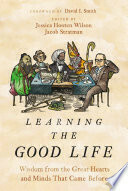
Discover the Good Life as You Learn from the Wise Voices of the Past We've lost ourselves. Disconnected from the past and uncertain about the future, we are anxious about what our lives will be and troubled by a nagging sense of meaninglessness. Adrift in the world, many Christians have their identity completely wrapped up in work and their definition of the "good life" is financial success. Fewer of are staying committed to the Christian faith, finding it difficult to reconcile their experience with their longings and desires. With so much uncertainty, where can we find a true vision of "the Good Life"? Learning the Good Life speaks to this malaise with trusted and assured voices from the past, inviting Christians into an age-old conversation with some of history's wisest hearts and minds as their dialogue companions. Featuring classic writings from a diverse lineup of over 35 writers and thinkers including Confucius, Augustine, Sor Juana Inés de la Cruz, W.E.B. DuBois, Flannery O'Connor, and Wendell Berry. Together these sages of the past address important issues such as: Vocation Calling Meaning Suffering Beauty Virtue Learning Wisdom Critical Thinking Community Wonder Reflection And more Each of these texts are introduced by experts who are teachers, from a variety of Christian colleges and universities, to help providing a broader, richer, and more cohesive narrative in which Christians may participate. In addition to a substantive introduction, each text is accompanied by discussion questions to provoke further thought and contemplation and also to facilitate discussion when used in groups. Ideal for any Christian seeking a deeper connection to the wisdom of the past and wanting a more cohesive and beautiful vision of the good life. All the writers have a message for you. All of them are calling you to die to yourself, to your habits of indulgence, to your pride and ambition, and instead, dedicate your time to learning, thinking, and loving. Writers and writings featured in Learning the Good Life include: Lao Tzu, From Tao Te Ching Confucius, Selections Plato, The Allegory of the Cave Seneca the Younger, "On the Shortness of Life" Athanasius, On the Incarnation Gregory of Nazianzus, On My Own Verses Augustine, On the Teacher Augustine, On Christian Doctrine, Book I. Pope Gregory the Great, Life of Saint Benedict, Dialogues, Book 2 Dante Alighieri, The Divine Comedy, Inferno 1 Nezahualcoyotl, "A Flower Song of Nezahualcoyotl" Margery Kempe, From "The Book of Margery Kempe" William Shakespeare, King Lear John Amos Comenius, From The Labyrinth of the World and the Paradise of the Heart George Herbert, Five Poems Blaise Pascal, Selections Matsuo Basho, Three Haiku Poems Sor Juana Ines de la Cruz, "Respuesta a Sor Filotea de la Cruz" John Milton, Areopagitica Jonathan Edwards, "Personal Narrative" Edmund Burke, Reflections on the Revolution in France Lord Alfred Tennyson, "Ulysses" Frederick Douglass, Narrative Life Elizabeth Barrett Browning, from Aurora Leigh Henry David Thoreau, "Life Without Principle" Gerard Manley Hopkins, "As Kingfishers Catch Fire" Fredrich Nietzsche, Use and Abuse of History (section IV) Anna Julia Cooper, From Womanhood: A Vital Element in the Regeneration and Progress of a Race W. E. B. DuBois, From The Souls of Black Folk Jarena Lee, From her autobiography Virginia Woolf, A Room of One's Own Dietrich Bonhoeffer, Life Together Simone Weil, "Reflections on the Right Use of School Studies" Flannery O'Connor, "Enduring Chill" Josef Pieper, Leisure: The Basis of Culture and Only the Lover Sings David Foster Wallace, "This is Water" Marilynne Robinson, "Reclaiming a Sense of the Sacred" Wendell Berry, "Manifesto: The Mad Farmer Liberation Front"